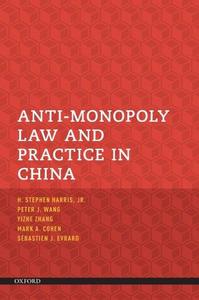
Anti-Monopoly Law and Practice in China By H. Stephen Harris, Peter J. Wang, Mark A. Cohen, Yizhe Zhang, Sebastien J Evrard
2011 | 592 Pages | ISBN: 019539478X | PDF | 3 MB
The China Anti-Monopoly Law (AML), which became effective August 1, 2008, is the first comprehensive competition law enacted by China. The AML prohibits a broad array of agreements between competitors and commercial counterparties, as well as competitive conduct by single firms that may harm the competitive process. In addition, it establishes a mandatory administrative review procedure for mergers and acquisitions between companies meeting certain sales thresholds, globally or in China. Beyond these fundamental provisions, the AML prohibits certain types of administrative abuses believed to be prevalent in China and establishes a complex set of administrative agencies with broad powers to enforce the law. Anti-Monopoly Law and Practice in China is the first comprehensive treatment of the AML and the practice of antitrust law under this new system. Each chapter on the substantive provisions of the law includes practical advice on approaches to meeting the challenge of complying with the law's requirements, including analysis of likely interpretations and applications of the AML based on precedents in related economic laws and actions by other administrative agencies. Where policy choices are uncertain, the text will explore probable developments in China based on comparable applications of competition laws in other jurisdictions.
Buy Premium From My Links To Get Resumable Support,Max Speed & Support Me
Links are Interchangeable - No Password - Single Extraction



